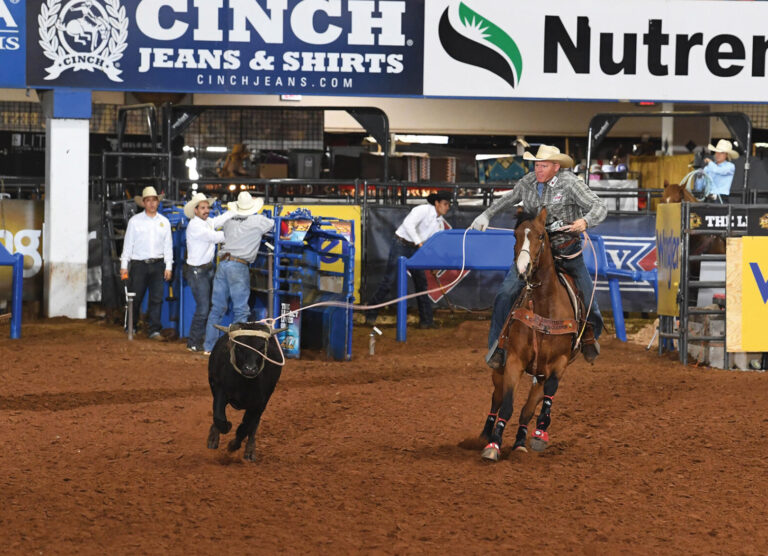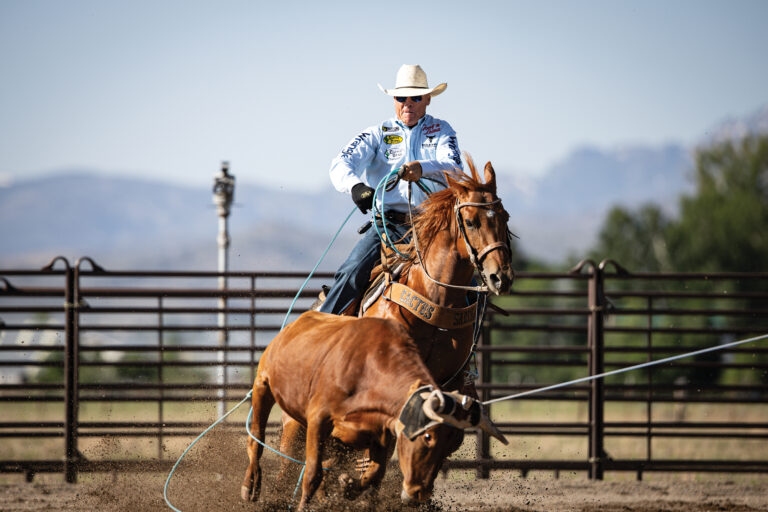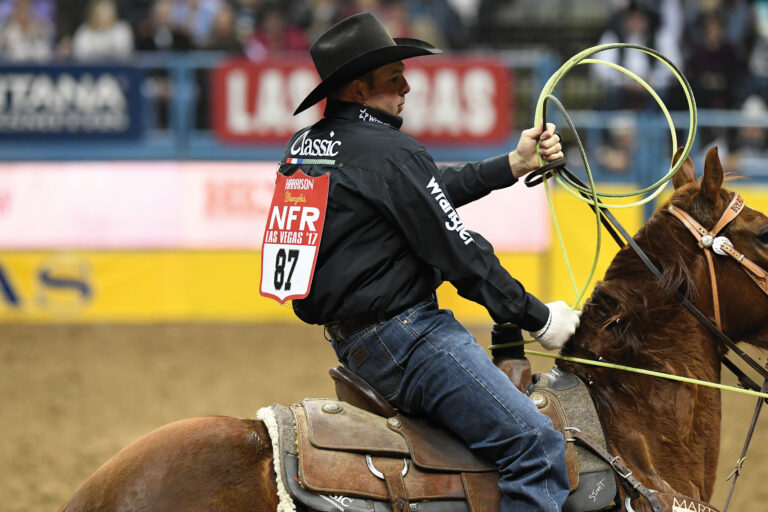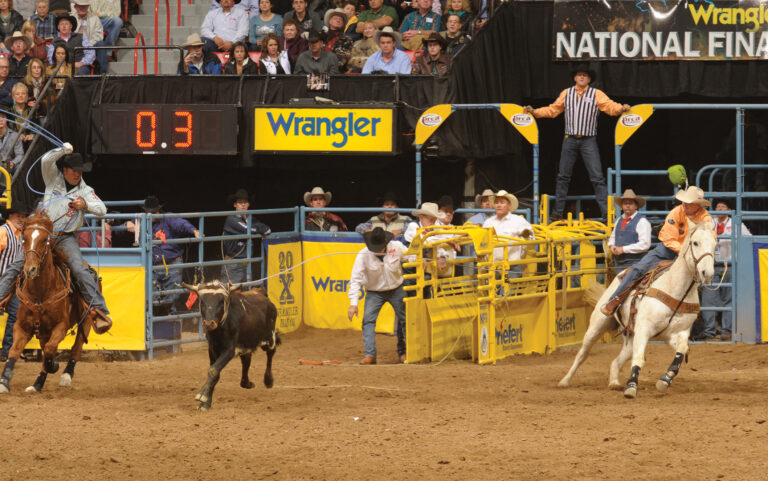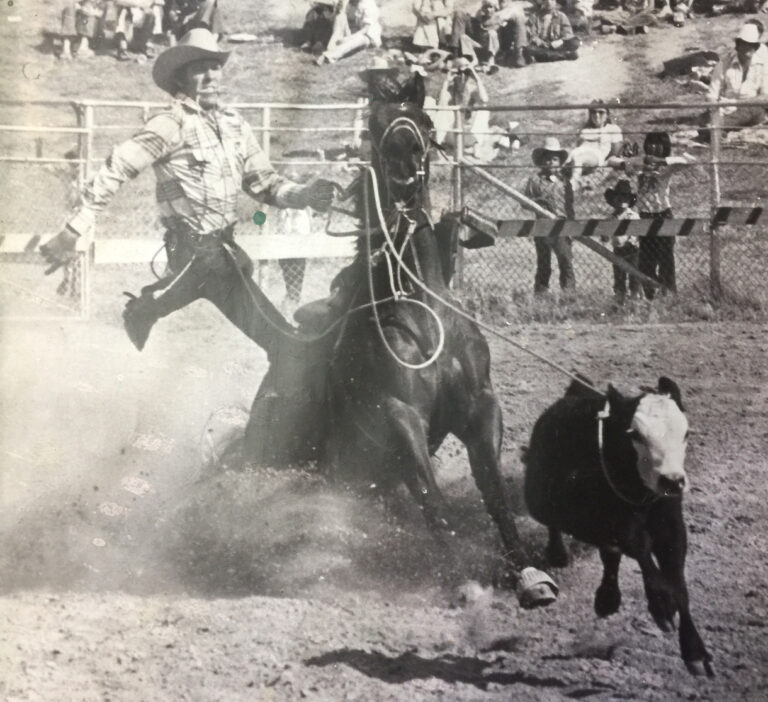Retired Staff Sergeant Michael Hall sat at a gas station outside of Oklahoma City in the fall of 2015, with his one horse in tow, in route to Charly Crawford and Trey Johnson’s free Military Team Roping School in Stephenville, Texas. He had just filled up his truck, and as he sat staring at his steering wheel that early morning, he fought off a strong inclination to turn around and head back home to Independence, Kansas.
Hall was a 19D Calvary scout in the Army—he was on the front lines as a Bradley commander, driving a tank in South Baghdad. He has a Purple Heart and an Army Commendation Medal with Valor, and he’d survived in some of the world’s harshest conditions.
“But this roping thing really got under my skin,” Hall admitted, who wasn’t accustomed to failure.
So Hall, a father of five with kids just starting to junior rodeo, got back on I-35 and headed south to Stephenville, fighting off the demons of doubt that plagued his confidence.
“I had been to the practice pen some, and I’d tracked a lot of cattle, and really started learning position. I’d track steers and rope the dummy, but I had never turned one before I went to Charly’s.”
Now, two years and two Charly Crawford and Trey Johnson Military Team Roping Schools later, Hall just won the first round of the team roping at the Professional Armed Forces Rodeo Association Finals, and he’s built lifelong bonds with Crawford, Johnson, and his fellow military team ropers.
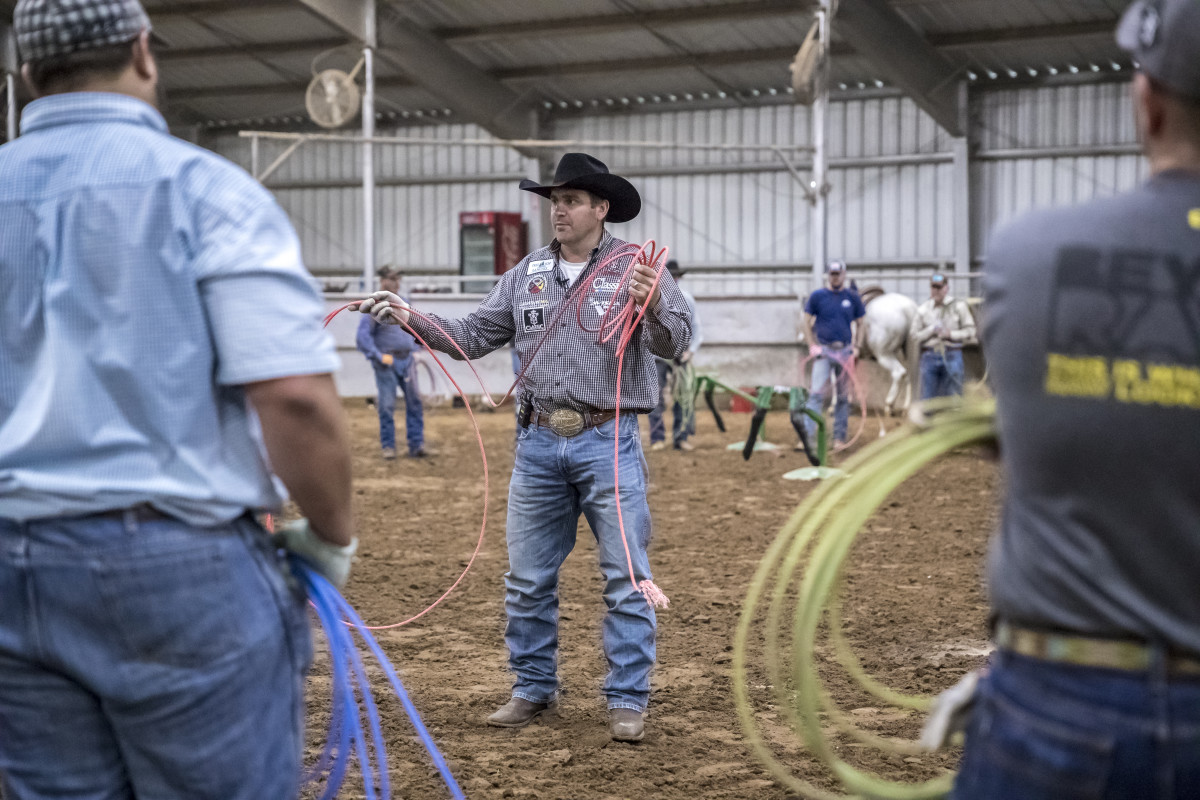
A few years ago, nine-time Wrangler National Finals Rodeo header Charly Crawford and his WPRA world champion wife, Jackie, sat down for lunch at a restaurant when a few service members walked in and took the table next to them. Quietly, Charly asked his server to bring the servicemen’s check to him to pay discreetly. After they left, he and Jackie reflected on the gesture.
“The main reason we are down here is to be able to give back and help others,” Crawford said. “We were thinking how small it was to cover their bill, and we wanted to be able to do more. It was on my heart—what do I do to give back? What do I do to inspire somebody? How will I be able to make an impact on others?”
They brainstormed a few ways they could use their resources to make more of a difference in the lives of military men and women. Charly’s dad served, and being grateful to the men and women who risk their lives for our country had always been close to his heart.
“We’ve had guys like that around the house. Those guys are willing to die for us. I’m passionate enough about guys who are badass enough.”
Tapping into his passions for service and for team roping, Crawford hosted his first school with then-partner and two-time WNFR heeler Shay Carroll in 2013, usually in Crawford’s home arena in Stephenville. (Rain caused Crawford to cancel the school in 2016, and in 2017 Lonestar Arena donated their arena to Crawford for use when rain was in the forecast again.) Johnson, a full-time traveling minister and former PRCA Resistol Rookie of the Year, joined with Crawford in 2014.
“It’s an opportunity for us to give back for what they’ve done for us,” Johnson said of the school, which is open to 15 headers and 15 heelers at no cost, so long as they have served.
The veterans often represent different branches of the military. Some have seen combat, and some shoulder their struggles right into the arena with them.
“The PTSD thing,” Hall said, referencing what has become—along with Traumatic Brain Injuries—the defining diagnosis of the post-9/11 veteran population, “in that arena, half of those guys have seen things. They’ll struggle, and it will be real.”
Johnson mentions a Marine who buried one of his friends who had committed suicide—another challenge that plagues the veteran community—the week prior to coming to the school.
“These guys are learning to cope with life,” Johnson said.
Which is why the Military Team Roping School isn’t just about team roping.
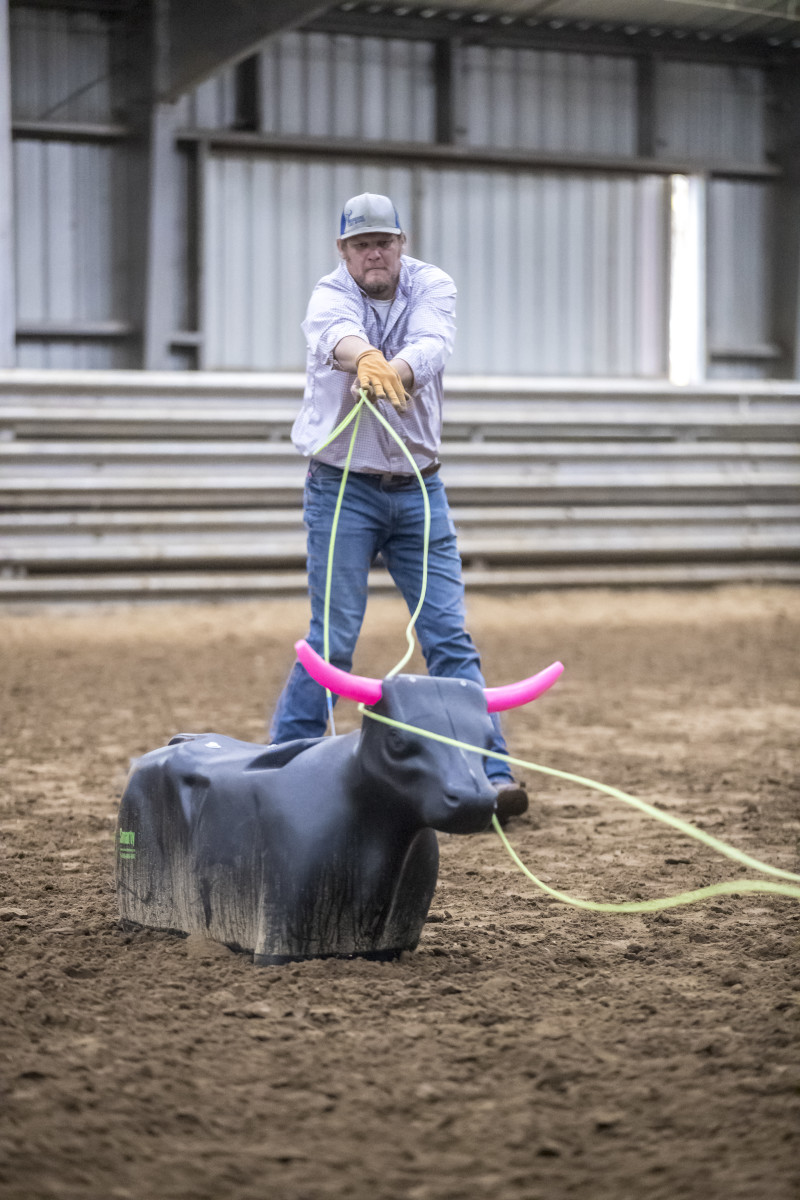
Hall walked into his first Military Team Roping School expecting a bunch of 6 and 7 ropers, guys he wouldn’t belong with. But quickly—very quickly—he realized these were his brothers in arms.
“It’s so much easier to walk into that arena,” Hall discovered of roping with his comrades. “We’re the same people. We’ve been the same places. I was in Iraq from 2003 to 2008. A lot of us have walked through the same dirt in South Baghdad. We have common ground.”
Since that first school Hall attended in 2015, he’s become close friends with retired Army infantryman Shawn Day.
“When we get together, we can remember who we were,” Day said. “We aren’t Trevor Brazile or Clif Cooper, and we’re never going to be that cool in our eyes, but we also know at one point in our lives, whether we were in Afghanistan or Vietnam, nobody in the world was as cool as us back then. That’s as cool as we were going to be. They’re where we would love to have gotten to in rodeo and roping, but they bring us all together. It’s amazing what they do for us.”
In short, Crawford and Johnson are offering these veterans what they offer to any other folks who attend their clinics: professional heading and heeling training.
“I am trying to take my skill set and make it enjoyable for a couple days,” Crawford put it.
But even at its most basic level, the training itself takes an approach that may be completely foreign to those who served.
“I fell off my horse at Charly’s arena,” Hall confessed. “He told me to dust it off, and we stopped the whole show until he got that deal lined out. When you come from the military, if you fall and nobody sees it, you pretend it didn’t happen and you keep going. In this deal, there was no hiding it. They don’t pick. They’ll stop and work with you. They give you the whole order.”
The practice of facing the problem was a running theme in this year’s school, one that was equally supported by Johnson’s daily sermons.
“He gave a sermon during lunch, and his deal was: Do it now,” Hall said. “Don’t drag your feet; don’t put it off until tomorrow. Video yourself; see what it is; fix it; do it now. It’s important today.”
Johnson’s perspective struck a chord with retired Marine Corps infantryman Chris Glarrow, too.
“I was frustrated one day and I knew I could do better. Trey said frustration and praise can’t be in the same place at the same time. He said to walk around praising and giving God thanks. The rest of the time that day I was catching a lot. It made a huge difference.”
Johnson continued his teachings by tying what works in the arena to what works in life.
“If you’re struggling in a relationship with your wife, your kids, your dog, your horse, figure out the problem and fix it now,” Hall recounted.
When looking for which messages to share, Johnson often looks to Matthew 6:33: “But seek first the kingdom of God above all else, and live righteously, and He will give you everything you need.”
“I talk about the importance of their thinking,” Johnson explained. “We all have a mind—what are we doing with it? What are we doing with our heart? And we all have a mouth—how are we using it? Are we speaking God’s promises, or are we speaking the problem?”
Paired with the camaraderie experienced when roping with their fellow veterans, knowing that even top rodeo athletes like Crawford and Johnson have struggles and have ways of coping with those struggles is enough of a similarity for the military ropers to see that there’s not much reason for them to not reach their own goals.
“Charly and Trey do a fantastic job of knowing where veterans come from,” Hall said. “As professional as they are, they get up in the morning and put their pants on one leg at a time, and they try to get better every day.
“I don’t get to ride every day. My body doesn’t take it. My vehicle caught a roadside bomb in Baghdad in 2006. I’ve had skin graphs on my legs, back surgery twice this summer. Leg surgery last summer. I want to be good at roping just as much as the next guy. With the physical limitations I have, it’s not going to happen, but it’s not an excuse to throw crap loops or not ride my horse to position.”
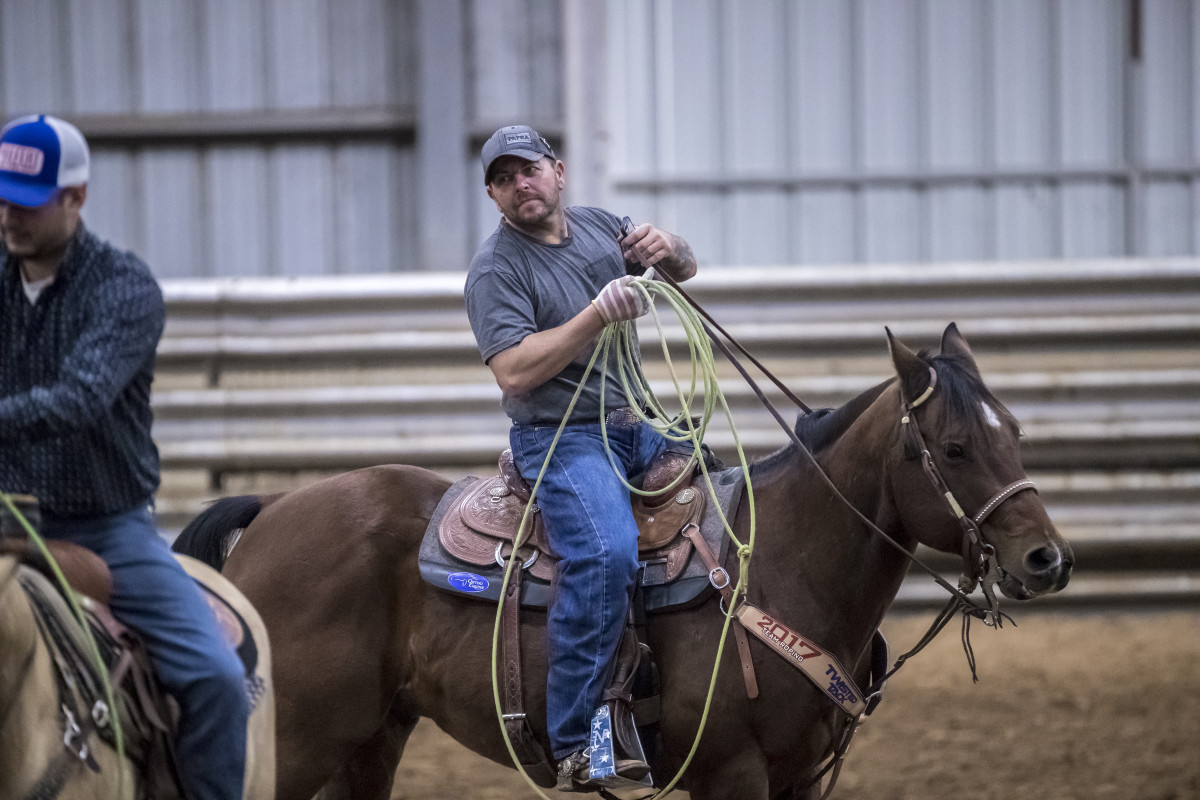
“I won a saddle right after I came back from Charly’s school,” Day recalled when asked how time spent in Stephenville impacted his skills in the arena. “It’s increased my roping ability—I got jumped quite a bit.”
Hall, who had zero team roping background before his first school, also saw immediate improvement.
“When I left,” he said, “I came home and I went back to the practice pen. I was turning steers in two weeks. Now, I’m a weekend warrior. I go rope as a 3. I get to play the game.”
Not that it all comes easy. There’s still work to be done, and Johnson’s lessons still apply.
“The first time I stepped in that arena and I paid my fees,” Hall continued, “I felt like I didn’t fit—like I didn’t belong. But as time goes on, you figure out how to fix yourself and work with what you’ve got. The first time I went out and won a check, that changed. Now, I do belong. And the first time someone came up and asked me if I wanted to rope, I felt like I was doing something right.”
“I like to remind them of the warriors they are and what they’ve overcome,” Johnson said of the messages he hopes the veterans keep close to their hearts. “I will speak a couple times a day and talk about their identity, their purpose, their destiny. We need their leadership. We need them to be pillars in their community and with their family and their kids. We want to make a difference in life in general.”
Crawford and Johnson aren’t just supplying roping tips and lip service either. When they say they want to make a difference, they mean it, and they make themselves available for it.
“That was the running joke of the whole thing,” Hall said. “Charly is a busy guy. He’s a NFR qualifier, but that flyer for the clinic has his personal cell phone number on it. And I left with Trey’s number—not because I was struggling, but because he and I had talked about some things—and he said, if I got to where I needed to talk, there was his number.”
Crawford and Johnson tell the veterans to call if they need them, and they make plans for the future.
“There are some neat relationships that are built,” Johnson said of the clinic. “One of the veterans came to work for me for six months or so, and another is working for a different roper. I’ve also talked to several of them who want me to come speak at their church and do private schools.”
Opportunities also exist for the military ropers the clinic helps to connect. Hall and Day speak weekly and make a point of traveling the 3.5 hours between them once a month to practice roping.
“There’s not many of us military rodeo guys,” Day said, speaking to the added benefit of the network created by the event. “We’d never have found each other.”
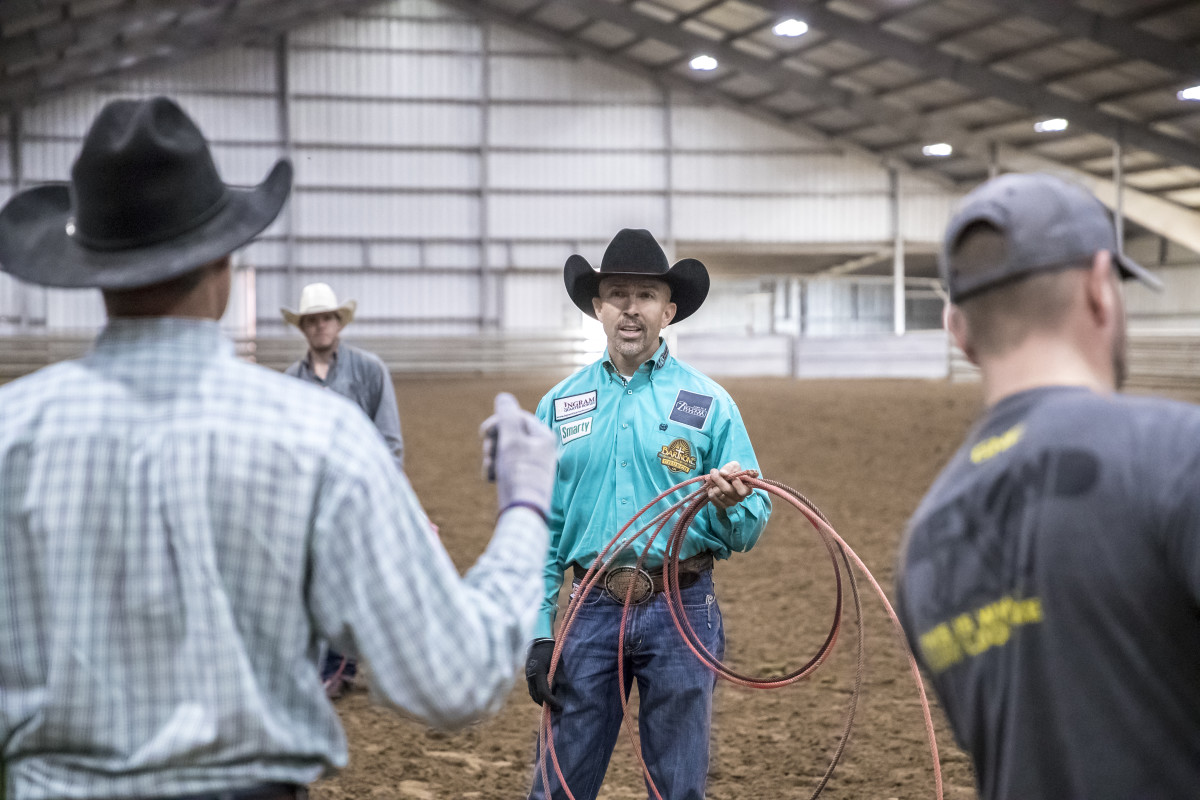
If there’s one aspect of everything offered that Crawford and Johnson don’t have to worry about, it’s gratitude. Their military ropers offer it readily.
“I didn’t have anywhere to stay and Charly let me stay in his living quarters trailer,” Glarrow said. “And Trey, he’s just an awesome teacher. They’re both amazing guys—down to earth. Something like that tells you what kind of person somebody is.”
“It makes me feel good to at least do something,” Crawford said. “It ain’t much, but it’s something, and they enjoy it.”
The sentiment is certainly true, but, according to Day, grossly understated.
“Charly and Trey will never understand what they do for us. It’s not in their nature. They’re just doing what they do, but to us, it’s massive—we’re getting help from the greatest cowboys in the world. And the fellowship and camaraderie—it’s just hard to grasp.” N




